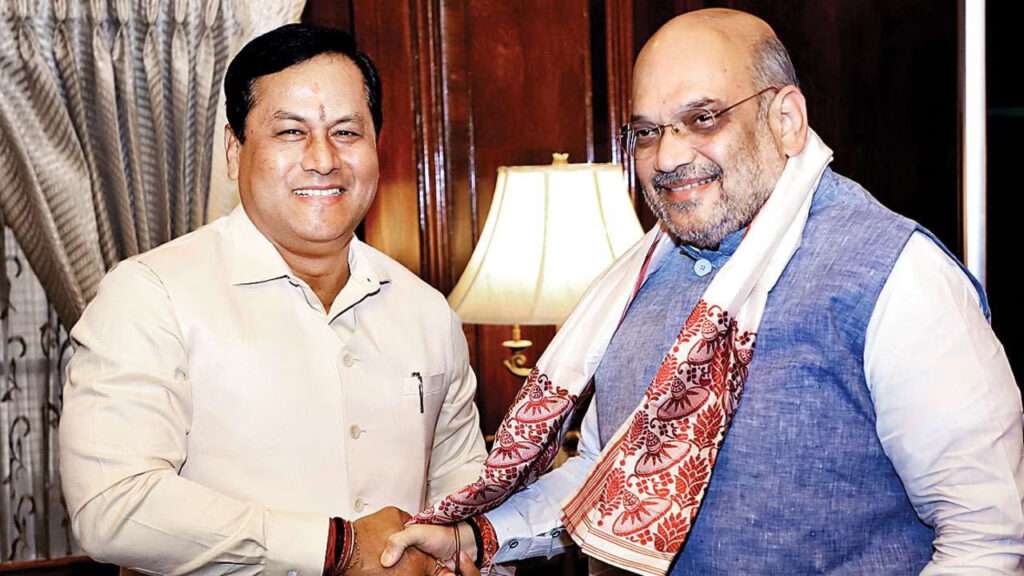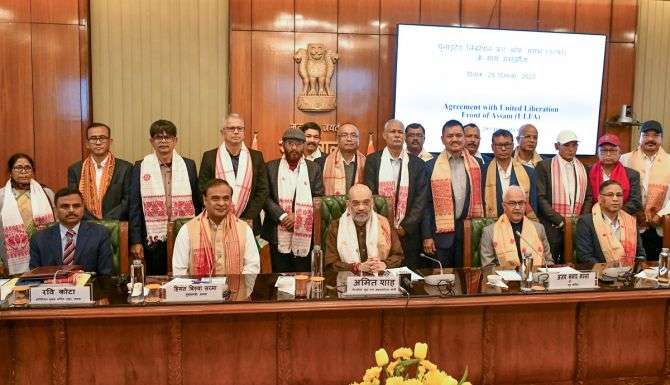The recent tripartite agreement signed in New Delhi among the pro-talks faction of the United Liberation Front of Asom (ULFA), the Union government, and the Assam State government marks the culmination of a prolonged process that commenced in 2009. The journey towards this resolution began almost 15 years ago when Arabinda Rajkhowa, the eventual face of the pro-talks faction, was arrested, and other key leaders surrendered. In 2011, following a unilateral ceasefire, the pro-talks faction signed a “suspension of operations” agreement, leading to the establishment of special camps called “Nabanirman Kendras” and the cessation of a 32-year-old insurgency.
The Assam-Ulfa Tripartite Agreement Unveiled
The talks process, which experienced numerous delays, concluded last week with the signing of the current tripartite memorandum of settlement. This agreement facilitates the surrender of arms by the faction’s cadres and the evacuation of their camps. The journey to this point has been protracted, with the “commander-in-chief” of the outfit, Paresh Baruah, opposing the dialogue process in 2009. Baruah insisted that the “sovereignty issue” should be part of the discussions. Since then, his faction, the ULFA (Independent), has remained hostile to the peace process, and Baruah is believed to be in northeast Myanmar. The ULFA (I) has weakened significantly over the years.
The decline of the ULFA from its peak in the 1990s, when it capitalized on discontent in rural Assam post the Assam Accord of 1985, can be attributed to various factors. The organization lost popular support, particularly among sections of Assam’s peasantry, due to its violent tactics targeting civilians, including migrant workers and the poor. The group relied on extortion and embraced a flawed chauvinist ideology that misconstrued the nature of the Indian state, yielding diminishing returns.

Military operations by Bhutan in the early 2000s dealt a blow to the insurgent might of the ULFA, and later, the Sheikh Hasina-led Awami League government in Bangladesh played a crucial role by handing over most of the outfit’s leaders. Subsequently, the pro-talks faction abandoned the demand for sovereignty, revising its charter of demands to accommodate the interests of the “indigenous people” of Assam while seeking an honorable exit. However, the prolonged talks process resulted in some cadres leaving the camps over the years, with a few joining the ULFA (I). Nevertheless, reports indicate a drastic reduction in recruits to the Baruah-led organization in recent years.
While the threat of militancy from the remnants of the ULFA has subsided dramatically in Assam, there is still much work to be done to elevate the livelihood standards of the peasantry in the northeastern state. Persistent poverty has been a significant factor driving mobilization on a narrow ethnic basis, with radical organizations like the ULFA espousing a version of ethnic identity that has fueled discontent. Addressing these socio-economic challenges is crucial for ensuring lasting peace and stability in the region.
The tripartite agreement represents a significant milestone in the journey towards reconciliation, but it should not be viewed as the end of the road. It is an opportunity to consolidate gains, build on the foundations of peace, and address the underlying issues that fueled insurgency in the first place. The government must remain committed to uplifting the socio-economic conditions in Assam, addressing grievances, and fostering inclusive development to prevent the resurgence of radical ideologies.
Also Read : BJP MP Pratap Simha’s Brother Arrested in Tree Felling Scandal
Furthermore, the success of the peace process hinges on the effective reintegration of former ULFA cadres into mainstream society. Rehabilitation programs, vocational training, and psychological support are essential components to ensure a smooth transition for these individuals. The government should also prioritize infrastructure development, education, and healthcare in the region to uplift communities that have long been marginalized.
International cooperation and collaboration are crucial in addressing cross-border challenges. The involvement of neighbouring countries, especially Myanmar and Bangladesh, in ensuring the extradition of key leaders and dismantling any remaining support networks is vital for regional security. A holistic approach that combines security measures with socio-economic development initiatives will be instrumental in preventing the resurgence of militancy in the region. While the tripartite agreement signifies a positive step towards peace, it is only the beginning of a larger process.

1 thought on “A New Chapter for Assam: Unpacking the Tripartite Agreement with ULFA”